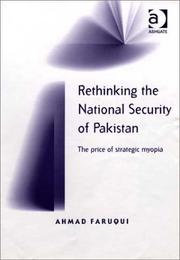| Listing 1 - 4 of 4 |
Sort by
|
Book
ISBN: 0312044984 Year: 1990 Publisher: Basingstoke London McGraw Hill
Abstract | Keywords | Export | Availability | Bookmark
 Loading...
Loading...Choose an application
- Reference Manager
- EndNote
- RefWorks (Direct export to RefWorks)
Pakistan - Military policy. --- Pakistan - Foreign relations.

ISBN: 0754614972 Year: 2002 Publisher: Burlington : Ashgate,
Abstract | Keywords | Export | Availability | Bookmark
 Loading...
Loading...Choose an application
- Reference Manager
- EndNote
- RefWorks (Direct export to RefWorks)
National security --- Sécurité nationale --- Pakistan --- Defenses --- Military policy --- Défense nationale --- Politique militaire --- PAKISTAN--NATIONAL SECURITY --- PAKISTAN--MILITARY POLICY --- PAKISTAN--POLITICS AND GOVERNMENT --- PAKISTAN--FOREIGN RELATIONS
Book
ISBN: 9780804776011 9780804776004 0804776016 0804776008 Year: 2012 Publisher: Stanford, Calif. Stanford Security Studies
Abstract | Keywords | Export | Availability | Bookmark
 Loading...
Loading...Choose an application
- Reference Manager
- EndNote
- RefWorks (Direct export to RefWorks)
Polemology --- Pakistan --- Nuclear weapons --- History --- Military policy --- #SBIB:327.5H22 --- #SBIB:328H56 --- Ontwapeningsproblemen - bewapening --- Instellingen en beleid: Pakistan --- Atomic weapons --- Fusion weapons --- Thermonuclear weapons --- Weapons of mass destruction --- No first use (Nuclear strategy) --- Nuclear arms control --- Nuclear disarmament --- Nuclear warfare --- Dominion of Pakistan --- Bākistān --- Islamic Republic of Pakistan --- Islamskai︠a︡ Respublika Pakistan --- Islami Jamhuriya e Pakistan --- Pākistāna --- پاکِستان --- Islāmī Jumhūrī-ye Pākistān --- باكستان --- Paquistan --- Пакістан --- Ісламская Рэспубліка Пакістан --- Пакистан --- Ислямска република Пакистан --- Isli︠a︡mska republika Pakistan --- Islamische Republik Pakistan --- Eʼeʼaahjí Naakaii Dootłʼizhí Bikéyah --- Pakistani Islamivabariik --- Πακιστάν --- Ισλαμική Δημοκρατία του Πακιστάν --- Islamikē Dēmokratia tou Pakistan --- Jamhuryat Islami Pakistan --- State of Pakistan --- Islāmī Jumhūriyah Pākistān --- パキスタン --- Pakisutan --- West Pakistan (Pakistan) --- Military policy. --- Nuclear weapons - Pakistan - History --- Pakistan - Military policy
Book
ISBN: 0674419774 0674419766 9780674419766 9780674728936 0674728939 9780674419773 Year: 2014 Publisher: Cambridge, MA
Abstract | Keywords | Export | Availability | Bookmark
 Loading...
Loading...Choose an application
- Reference Manager
- EndNote
- RefWorks (Direct export to RefWorks)
Since Pakistan gained independence in 1947, only once has an elected government completed its tenure and peacefully transferred power to another elected government. In sharp contrast to neighboring India, the Muslim nation has been ruled by its military for over three decades. Even when they were not directly in control of the government, the armed forces maintained a firm grip on national politics. How the military became Pakistan's foremost power elite and what its unchecked authority means for the future of this nuclear-armed nation are among the crucial questions Aqil Shah takes up in The Army and Democracy. Pakistan's and India's armies inherited their organization, training, and doctrines from their British predecessor, along with an ethic that regarded politics as outside the military domain. But Pakistan's weak national solidarity, exacerbated by a mentality that saw war with India looming around every corner, empowered the military to take national security and ultimately government into its own hands. As the military's habit of disrupting the natural course of politics gained strength over time, it arrested the development of democratic institutions. Based on archival materials, internal military documents, and over 100 interviews with politicians, civil servants, and Pakistani officers, including four service chiefs and three heads of the clandestine Inter-Services Intelligence, The Army and Democracy provides insight into the military's contentious relationship with Pakistan's civilian government. Shah identifies steps for reforming Pakistan's armed forces and reducing its interference in politics, and sees lessons for fragile democracies striving to bring the military under civilian control.
Civil-military relations --- Democracy --- Military and civilian power --- Military-civil relations --- Executive power --- Sociology, Military --- Military government --- Pakistan. --- Political activity. --- History. --- Pakistan --- Dominion of Pakistan --- Bākistān --- Islamic Republic of Pakistan --- Islamskai︠a︡ Respublika Pakistan --- Islami Jamhuriya e Pakistan --- Pākistāna --- پاکِستان --- Islāmī Jumhūrī-ye Pākistān --- باكستان --- Paquistan --- Пакістан --- Ісламская Рэспубліка Пакістан --- Пакистан --- Ислямска република Пакистан --- Isli︠a︡mska republika Pakistan --- Islamische Republik Pakistan --- Eʼeʼaahjí Naakaii Dootłʼizhí Bikéyah --- Pakistani Islamivabariik --- Πακιστάν --- Ισλαμική Δημοκρατία του Πακιστάν --- Islamikē Dēmokratia tou Pakistan --- Jamhuryat Islami Pakistan --- State of Pakistan --- Islāmī Jumhūriyah Pākistān --- パキスタン --- Pakisutan --- West Pakistan (Pakistan) --- Military policy. --- Politics and government. --- Civil-military relations - Pakistan --- Democracy - Pakistan --- Pakistan - Military policy --- Pakistan - Politics and government
| Listing 1 - 4 of 4 |
Sort by
|

 Search
Search Feedback
Feedback About UniCat
About UniCat  Help
Help News
News